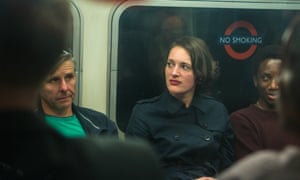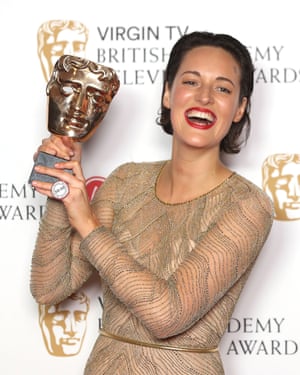Phoebe Waller-Bridge: ‘I felt strongly there was no such thing as a slut’ | Television & radio
‘Being proper and sweet and nice and pleasing is a fucking nightmare. It’s exhausting. As women, we get the message about how to be a good girl â€" how to be a good, pretty girl â€" from such an early age. Then, at the same time, we’re told that well-behaved girls won’t change the world or ever make a splash. So it’s sort of like, well, what the fuck am I supposed to be? I’m supposed to be a really polite revolutionary?†Phoebe Waller-Bridge spreads her arms and starts to laugh. “It’s impossible.â€
Waller-Bridge has made a splash and changed the world we see on TV by writing and playing two characters who are neither sweet nor polite. At the start of last year, she was a virtually unknown actor, who had spent more time temping than on screen or stage. Then Channel 4 screened Crashing, her series about a group of twentysomethings who live together in domestic and romantic chaos as property guardians in a disused London hospital. Waller-Bridge played the dangerously spontaneous, sexually disruptive Lulu, who created havoc even by the standards of this anarchic little millennial community.
The multi-award-winning Fleabag followed on the BBC, in which she played the eponymous antiheroine, a profane, damaged, promiscuous cafe owner who torments her repressed middle-class family, gets caught by her boyfriend masturbating beside him in bed to news footage of Barack Obama, and cracks deeply non-PC jokes to the camera. “We’re going to die here,†her uptight sister panics, as they enter a strange house in an unfamiliar neighbourhood. “We’re going to be raped and die.†Fleabag flashes straight back: “Every cloud …†Not since Ricky Gervais created The Office has a newcomer appeared and rewritten the grammar of television comedy overnight.
Having just turned 32, Waller-Bridge is an international sensation, feted from the pages of the Sun to the New Yorker. She is filming a Star Wars movie, making an eight-part drama, Killing Eve, for American TV and about to stage Fleabag as a theatrical production at the Edinburgh fringe, with a new actor in the lead. For most of this year, she was the bookies’ favourite to play the new Doctor Who, but, with a second TV series of Fleabag to write next year, was too busy to consider taking on the role. The poster girl for a new pressure group, Equal Representation for Actresses, she is a forceful feminist and strides into the cafe where we meet looking like a model: tall and rangy and commandingly chic.

Did she always know she had an extraordinary talent? “Extra-ordinary talent,†she repeats slowly, turning the words over and starting to laugh. Oh, God, I say quickly. Did that sound horribly cheesy?
“No, no! Blimey, you can say it as much as you like. I’ll take that home with me and say it to myself later.†She laughs again. “No, do you know what, I was actually having this conversation the other day, about relationships with yourself as an artist. Because I think to be one, you have to have confidence in what you want to say. I think on some level I did feel like I had found something I’m good at â€" and what a relief to find that thing.â€
She had known from eight that she wanted to act, was the star of every play at her private Catholic school in London and at 17 won a place at Rada. “And then, throughout drama school, there was a slow realisation that I couldn’t act. I was terrible. Yes, it really knocked my confidence. I was really young when I went in, and I really wanted to please. I don’t think you can be a good actor and want to please because so much about performing and acting is surprising people. But at drama school, I felt like what they wanted from me was for me to just get it right somehow. It’s not really the fault of the drama school. I think I was just really keen to get it right.†At graduation she thought she had. “I was like, yes! I’m ready!†And then she didn’t work for two years.
By the time she met Vicky Jones, an artistic director, she was broke, demoralised and angry. As no one was giving them any work, they created their own theatre company, DryWrite, and spent two years staging short plays by new writers. As soon as Jones is mentioned, Waller-Bridge’s whole face lights up. “My whole career is basically down to Vicky.â€
After a writer dropped out at short notice, Jones talked her into writing a 10-minute piece. It soon became six short plays, which Jones persuaded the Soho theatre in London to stage. A TV production company promptly signed Waller-Bridge up to write a pilot of what would become Crashing. The script sat on a Channel 4 desk, unread, until she performed Fleabag as a one-woman show at the Edinburgh fringe in 2013, won multiple awards and, on the strength of her performance, was cast in the ITV drama Broadchurch. The “Obama wank†scene (“I can’t believe no one thought of doing it before,†she grins, “it’s so relatableâ€) got Fleabag snapped up for a TV pilot, moved Crashing to the top of Channel 4’s pile, “and then it just never stopped. Crashing rolled over into Fleabag, and Fleabag went berserk.â€

She wasn’t sure how the show would go down, it being unlike anything on TV before, but sees now this was, of course, the key to its appeal. Does she think audiences fell in love with it because it was so shocking â€" or so recognisable?
“I’m still asking people what it was for them. I get, ‘I am Fleabag,’ a lot. I get them saying, ‘That’s my dad,’ or, ‘That’s my stepmother,’ or ‘That’s my sister.’ I think a lot of people recognise these characters trying to connect and failing. That’s something that has always really got me, watching people try, and fail, [to connect].â€
Her character’s preferred method is via sex, and Waller-Bridge thinks there was a certain shock value appeal in a woman expressing her sexual desires so frankly. But it is a faulty connection, and Fleabag’s desire is more for the escapism and power than actual physical gratification of sex.
“Yes, because so many people feel like that. It’s about the drama and the validation and the sense of worth, and the sense of being taken somewhere else. I think true connection through sex is something that’s so rare, when people really …†She breaks off, starting to laugh again. “I was going to say, come together. I think that’s something we’re all looking for all the time.â€
Fleabag doesn’t find it in her random, recklessly careless sexual encounters â€" and neither, in her 20s, did Waller-Bridge. “You’re always being told you’re at your peak, you’re the most attractive you’ll ever be, so get out there and use it. You have a finite amount of time that everyone will want to fuck you. But it’s such a weird conflicted message: I must be more promiscuous, I must make the most of this dying, shrivelling shell that I’ve been gifted for this short amount of time, but, at the same time, it’s ‘don’t be a slut’, you know? I felt really strongly while writing Fleabag that there was no such thing as a slut, and I was just going to erase that from the equation.â€
Some critics have described her character as unlikable. “I love her,†she says quickly. Was she surprised anyone didn’t? “No, I sort of saw that coming because she makes mistakes and she’s sometimes dismissive and cruel. But for me, as long as she’s funny, you can get away with anything.â€
As research for her new American TV drama, Killing Eve, Waller-Bridge consulted a lot of psychiatrists who work with psychopaths. “The thing that people say about them is they’re just so funny, so you can’t help but love them. So, even though you know they have done these terrible crimes and these terrible things, if someone surprises you, makes you laugh, disarms you, they can do anything. It’s why I love comedy so much and why I think it’s such a powerful, powerful tool.â€

Does she have no fear of disapproval? “Do you know what? I had such a supportive family, and I think that affects your life in such a profound way; it fortifies you, completely.†Waller-Bridge grew up in a leafy suburb of west London; her father worked in the City, but is now a photographer and her mother works for the Ironmongers’ Guild. “My dad always said: ‘Use your voice. Use your voice. Use your voice.’ He taught me about feminism at a really young age. Then my mum as well, you know, she continues to be the most supportive person in my life. She roars with laughter at any kind of joke.â€
Waller-Bridge would be an unusual performer not to crave the approval of strangers. “I would be lying if I said I didn’t feel as if I needed the approval of strangers as well.†But can she live with their disapproval? She hesitates.
“Actually, do you know what n … Oh God, I promised myself that I was going to be so honest. OK, so when Crashing first came out, there were a couple of reviews that really slated it, and that really, really hurt. I felt a lot of shame about putting myself out there, like I’d humiliated myself and wasn’t worthy of writing stuff. I’m not saying that people shouldn’t slate each other’s work if it’s shit, but I did think: fuck, how has this happened?†She opted to be abroad on holiday with her husband, the documentary maker Conor Woodman, when Fleabag first aired and came home to an entirely different life.
Twenty months later, she is having “the most fun everâ€, filming the new Han Solo Star Wars film while shooting Killing Eve, and is elated to have found an actor to play the eponymous Fleabag on stage at Edinburgh. “We thought for ages that it would take a real dramatic actor to carry it, so we saw all these really serious actors, and when it’s not funny it’s the worst thing. Doing, ‘Do I have a big arsehole?’ without humour is just aggressive and awful.†Then Jones thought of the comic actor Maddie Rice, “And we saw her and, within seconds, we just knew. From that moment, I knew the show could have a life outside of me performing, and that would be an amazing thing.â€
Waller-Bridge feels optimistic about the future for female performers in general. “I think there is hope. Supporting the Equal Representation for Actresses movement is really important. And I’m assuming that now because there are so many conversations about it and we’re doing things, the pay gap can’t be there for ever. There’s a new wave of anger and mobilisation now, so things must be changing behind the scenes.†She pauses, then grins. “But wouldn’t it be exciting if all women just went on strike? Just a woman’s strike. Everything would fall apart pretty quickly then, wouldn’t it?â€
Success doesn’t necessarily make people as happy as they often expect it to, but, in Waller-Bridge’s case, I get the impression it absolutely has. Am I right? “I think when you have been working for something so hard for so long. And then when it finally goes well and it finally resonates, I think it sets you to normal. The rest of the time you don’t feel normal because you’re trying to connect to people. And then when eventually the voice comes back going: ‘You’re heard and we feel you and we relate and we’re with you,’ you can kind of go,†and she flops and sighs. “So I feel a bit more peaceful. But I think the main thing is knowing I’m not crazy.â€
Fleabag is on at the Underbelly, as part of the Edinburgh fringe festival, from 21-27 August 2017.

0 Response to "Phoebe Waller-Bridge: ‘I felt strongly there was no such thing as a slut’ | Television & radio"
Posting Komentar